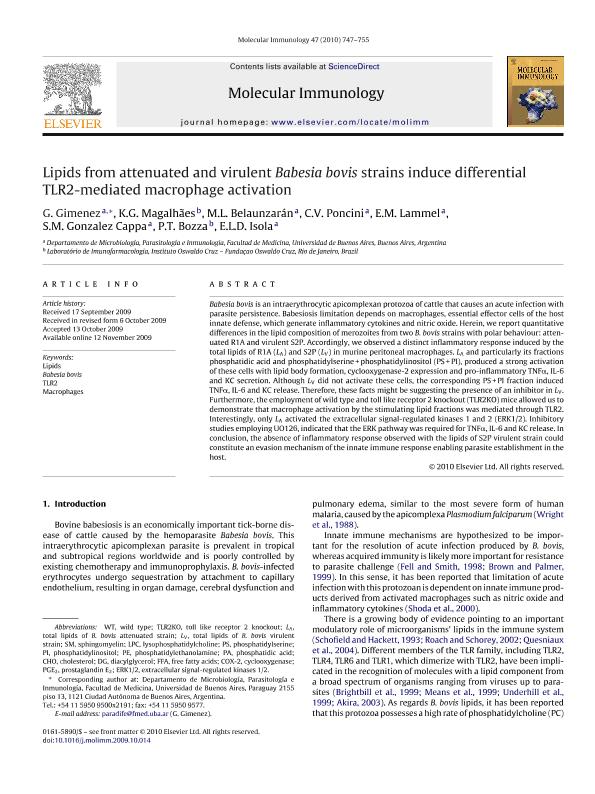Artículo
Lipids from attenuated and virulent Babesia bovis strains induce differential TLR2-mediated macrophage activation
Gimenez, G.; Magalhães, K. G.; Belaunzarán, María Laura ; Poncini, Carolina Verónica
; Poncini, Carolina Verónica ; Lammel, Estela María
; Lammel, Estela María ; Gonzalez Cappa, S. M.; Bozza, P. T.; Isola, E .L .D.
; Gonzalez Cappa, S. M.; Bozza, P. T.; Isola, E .L .D.
 ; Poncini, Carolina Verónica
; Poncini, Carolina Verónica ; Lammel, Estela María
; Lammel, Estela María ; Gonzalez Cappa, S. M.; Bozza, P. T.; Isola, E .L .D.
; Gonzalez Cappa, S. M.; Bozza, P. T.; Isola, E .L .D.
Fecha de publicación:
01/2010
Editorial:
Pergamon-Elsevier Science Ltd
Revista:
Molecular Immunology
ISSN:
0161-5890
Idioma:
Inglés
Tipo de recurso:
Artículo publicado
Clasificación temática:
Resumen
Babesia bovis is an intraerythrocytic apicomplexan protozoa of cattle that causes an acute infection with parasite persistence. Babesiosis limitation depends on macrophages, essential effector cells of the host innate defense, which generate inflammatory cytokines and nitric oxide. Herein, we report quantitative differences in the lipid composition of merozoites from two B. bovis strains with polar behaviour: attenuated R1A and virulent S2P. Accordingly, we observed a distinct inflammatory response induced by the total lipids of R1A (L(A)) and S2P (L(V)) in murine peritoneal macrophages. L(A) and particularly its fractions phosphatidic acid and phosphatidylserine+phosphatidylinositol (PS+PI), produced a strong activation of these cells with lipid body formation, cyclooxygenase-2 expression and pro-inflammatory TNFalpha, IL-6 and KC secretion. Although L(V) did not activate these cells, the corresponding PS+PI fraction induced TNFalpha, IL-6 and KC release. Therefore, these facts might be suggesting the presence of an inhibitor in L(V). Furthermore, the employment of wild type and toll like receptor 2 knockout (TLR2KO) mice allowed us to demonstrate that macrophage activation by the stimulating lipid fractions was mediated through TLR2. Interestingly, only L(A) activated the extracellular signal-regulated kinases 1 and 2 (ERK1/2). Inhibitory studies employing UO126, indicated that the ERK pathway was required for TNFalpha, IL-6 and KC release. In conclusion, the absence of inflammatory response observed with the lipids of S2P virulent strain could constitute an evasion mechanism of the innate immune response enabling parasite establishment in the host.
Palabras clave:
BABESIA BOVIS
,
LIPIDS
,
MACROPHAGES
,
TLR2
Archivos asociados
Licencia
Identificadores
Colecciones
Articulos(IMPAM)
Articulos de INSTITUTO DE INVESTIGACIONES EN MICROBIOLOGIA Y PARASITOLOGIA MEDICA
Articulos de INSTITUTO DE INVESTIGACIONES EN MICROBIOLOGIA Y PARASITOLOGIA MEDICA
Citación
Gimenez, G.; Magalhães, K. G.; Belaunzarán, María Laura; Poncini, Carolina Verónica; Lammel, Estela María; et al.; Lipids from attenuated and virulent Babesia bovis strains induce differential TLR2-mediated macrophage activation; Pergamon-Elsevier Science Ltd; Molecular Immunology; 47; 4; 1-2010; 747-755
Compartir
Altmétricas



